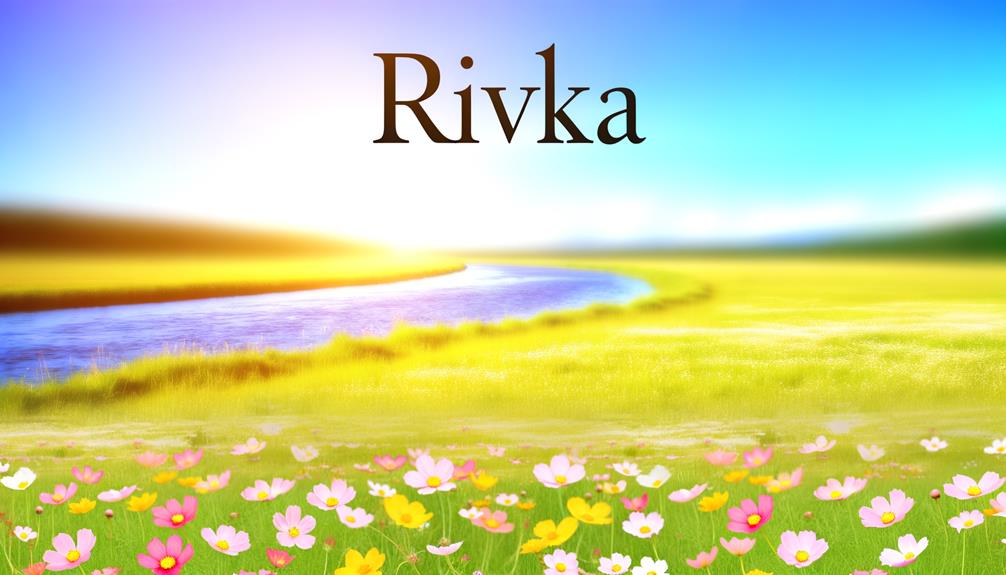Meaning of the Name Rivka
The name Rivka, derived from the Hebrew Bible, is historically significant as the wife of Isaac and mother of Jacob and Esau. It symbolizes the matriarchal strength pivotal in continuing the Abrahamic covenant.
In Jewish culture, Rivka is revered, while in Christian contexts, she represents virtue and wisdom. The name translates to Rebecca in English and has various linguistic adaptations like Revekka in Slavic languages.
Modern usage has sustained its popularity due to its phonetic elegance and cultural heritage, making it a name of enduring resonance. For deeper understanding, consider exploring the profound legacy associated with Rivka.

Key Takeaways
- Rivka is a Hebrew name from the Bible, meaning "to bind" or "to tie."
- Rivka is the wife of Isaac and mother of Jacob and Esau in the Hebrew Bible.
- The name Rivka symbolizes resilience, strength, and wisdom in Jewish culture.
- Rivka translates to Rebecca in English and has variations like Revekka in Slavic languages.
- Modern usage of Rivka reflects a balance of cultural heritage and contemporary naming trends.
Biblical Origins
The name Rivka, originating from the Hebrew Bible, is first introduced in the Book of Genesis as the wife of Isaac and the mother of Jacob and Esau. Her narrative, encapsulated in Genesis 24-27, delineates a figure of considerable influence and agency.
The etymology of Rivka is often interpreted to mean 'to bind' or 'to tie,' which can be seen as symbolic of her pivotal role in uniting the lineages of Abraham and Isaac. Rivka's actions, including her initiative in securing Jacob's blessing, highlight her as a central character in the continuation of the Abrahamic covenant.
Her story not only underscores familial and dynastic themes but also provides insights into the socio-religious context of the time.
Cultural Significance
Rivka's enduring legacy extends beyond her biblical narrative, permeating various cultural, religious, and literary traditions throughout history. Revered in Jewish culture as one of the matriarchs, her name symbolizes strength and familial devotion. In Christian contexts, Rivka (Rebecca) is often cited as a paragon of virtue and faithfulness. Literature, from ancient texts to modern novels, frequently invokes her character to represent wisdom and resilience. The following table highlights Rivka's cultural significance across different domains:
| Domain | Significance |
|---|---|
| Jewish Culture | Matriarchal Symbol |
| Christian Context | Paragon of Virtue |
| Literature | Representation of Wisdom |
| Art | Iconographic Depictions |
| Modern Usage | Symbol of Resilience and Strength |
This multifaceted cultural resonance underscores the name's profound impact.
Linguistic Variations
Numerous linguistic variations of the name Rivka can be observed across different cultures and languages, reflecting its historical and geographical diffusion.
In Hebrew, Rivka (רִבְקָה) directly translates to Rebecca in English, indicating a smooth transliteration.
The Latin form, Rebecca, has permeated various European languages, including Spanish (Rebeca), French (Rébecca), and Italian (Rebecca).
In Slavic languages, such as Russian, the name is rendered as Ревекка (Revekka).
These variations not only highlight phonetic adjustments but also cultural adaptations. Each linguistic transformation preserves the name's core identity while aligning with regional phonological norms.
This linguistic diversity underscores the name's enduring popularity and adaptability across different linguistic and cultural landscapes.
Famous Namesakes
Famous namesakes of the name Rivka provide a compelling lens through which to explore its cultural significance and historical impact.
Rivka Galchen, an acclaimed contemporary author, has brought the name into modern literary prominence. Her works, often lauded for their intellectual depth and narrative innovation, underscore the name's association with intellectual rigor and creativity.
Historically, the name Rivka is also tied to the biblical matriarch Rebecca, a figure of great importance in Judeo-Christian traditions. Her story, marked by themes of resilience and familial devotion, has cemented Rivka as a name imbued with profound cultural resonance.
These prominent figures highlight how the name Rivka is both a bridge to historical roots and a beacon in contemporary discourse.
Modern Usage
In contemporary society, the name Rivka has maintained a steady presence, reflecting its enduring appeal and versatility across various cultural contexts. Mainly found in Jewish communities, Rivka is a name imbued with historical and religious significance. Its modern usage often signifies a connection to tradition and heritage. In addition to its significance in Jewish culture, the name Rivka has also gained popularity in non-Jewish communities, reflecting its widespread recognition and appreciation. The origins and history of the name Riva can be traced back to the biblical figure of Rebecca, known for her kindness and beauty. This timeless name continues to endure, serving as a symbol of strength and resilience across different generations and societies.
However, it has also transcended its roots, gaining traction among diverse populations who appreciate its phonetic elegance and simplicity. The name's adaptability is evident in its various spellings and pronunciations, such as Rebecca or Rivkah, which allow it to blend seamlessly into different linguistic environments.
This duality of maintaining cultural integrity while embracing modernity underscores Rivka's persistent relevance in contemporary naming practices.
Conclusion
To sum up, the name Rivka emerges from rich biblical origins, embodying profound cultural significance and linguistic variations. Its presence in religious texts underscores its historical importance, while its adaptation across cultures highlights its enduring appeal. Famous namesakes further contribute to its recognition, and its modern usage reflects both tradition and contemporary relevance.
Although some might argue that names lose relevance over time, Rivka demonstrates a timeless resonance, maintaining its significance through diverse contexts and generations.






